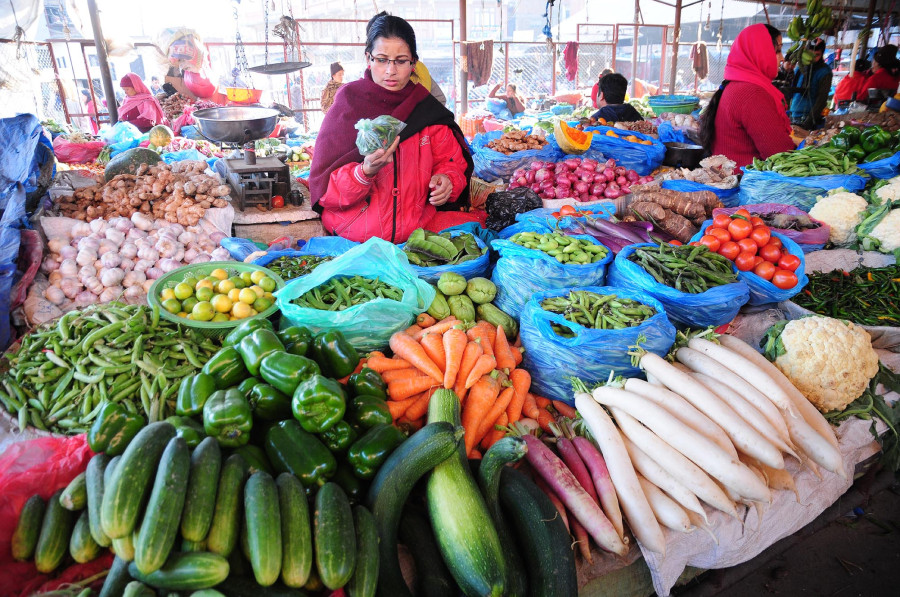National
All you need to know about the debate over pesticide residue tests
Vegetables and fruits that may have high levels of pesticide residue and other chemicals can make their way into the kitchens of Nepali households.
Chandan Kumar Mandal
The government has revoked its decision to quarantine and conduct pesticide residue tests for agriculture produce imported from India, which has stirred a debate as the decision has direct and major implications on public health. Here is what you need to know about the government’s earlier decision, the supply and price disruption it created in the market, its move to revoke the earlier decision, and its implications.
What disrupted the import of vegetables and fruits at the Nepal-India border?
Following the Cabinet decision that came into effect on June 17, border authorities did not allow the passage of fruits and vegetables without first conducting laboratory tests for pesticide residues because the new decision required importers to acquire clearance from the Food Import Export Quality Certification Office and Plant Quarantine Office at customs checkpoints.
Was the decision effective?
The decision taken to ensure healthy vegetables and fruits to consumers’ kitchens was also aimed at minimising the country’s dependency on imports of these products and promote domestic agriculture produce. However, a lack of homework on the part of the government has only resulted in chaos at the border, losses in millions and supply and price disruption in the market.
In the week leading to the enforcement of the decision, large consignments of vegetables and fruits had queued up on the Indian side as authorities responsible to conduct the tests lacked resources and manpower required to perform the tests. The failure to implement the decision sans lab facilities and other resources had an impact on the market prices of fruits and vegetables. India alone supplies nearly 40 percent of the total demand of the central vegetable market in Kalimati and the drama in the border disrupted the supply chain in Kathmandu.
Why couldn’t the tests take place effectively?
Authorities on the Nepali side lacked laboratory equipment and a sizeable technical team to conduct tests of agricultural produce at customs checkpoints. This led importers to send samples to Kathmandu for tests while the trucks laden with produce were stuck at the border. There were tons of vegetables stuck on the Indian side of the border at various checkpoints in Biratnagar, Birgunj, Bhairahawa and Nepalgunj, among others. Even in Birgunj and Biratnagar, where there are quarantine tests facilities at customs checkpoints, the importers were clueless about pesticide residue tests.
Nepal government currently conducts pesticide residue tests on agricultural produce in all the seven provinces–at Kathmandu (in Kalimati), Sarlahi, Birtamod, Butwal, Nepalgunj, Pokhara and Attariya—but these laboratories lack minimum resources and technical team. In Butwal, for example, no tests have been conducted due to lack of officials.
According to Plant Quarantine and Pesticide Management Centre, Nepali laboratories can conduct tests only for two pesticides—Carbamates and Organophosphate. But there are more than two dozen pesticides in use across the country. Also, the government has not introduced any national standards or adopted any international standard on the maximum level of pesticides residue permissible in agriculture produce. The abrupt decision to quarantine and conduct pesticide residue has hence only drawn criticisms from all quarters.
What was the impact of mismanagement at the customs points on the market?
Losses in millions were incurred as trucks laden with vegetable and fruits were stranded on the border for days. Fruits worth some Rs30million decayed according to Nepal Fruits Wholesaler Association. Some importers were compelled to sell fruits at cheaper rates in the nearby Indian market. Likewise, the impact of the limited supply of vegetables and fruits directly hit consumers. Owing to supply disruption at customs checkpoints, prices of vegetables and fruits went up by a whopping 69 percent at Kalimati vegetable market which largely relies on imported produce from India.
Why did the government withdraw its decision to quarantine and conduct pesticide residue tests?
Following the decision to quarantine and conduct pesticide residue tests on agriculture produce imported from India, the Indian Embassy in Kathmandu mounted pressure on the Nepal government to revoke its decision. On the other hand, there was a shortage of vegetables and fruits in the market, thanks to the state’s myopic approach to an important public health issue. On Thursday, the government, through a Cabinet decision, withdrew the mandatory tests on imported agricultural produce.
The Ministry of Industry, Commerce and Supplies had taken the proposal to the Cabinet asking to revoke the decision citing poor infrastructure to implement the decision with immediate effect. According to Chakrapani Khanal, minister of agriculture and livestock development, it would take a minimum of nine months to complete all the arrangements for conducting such tests at the checkpoints even if the Ministry of Finance agrees to allocate the budget for the purpose. Revoking the decision means vegetable and fruits that may have high levels of pesticide residue and other chemicals can make their way into the kitchens of Nepali households.
International communities have developed Codex standards that are used as a reference for international trade in food so that consumers around the world remain ensured that the food they consume meets the agreed standards for safety and quality, irrespective of its origin. Currently, there are Codex standards for more than 100 different pesticides.




 29.24°C Kathmandu
29.24°C Kathmandu














